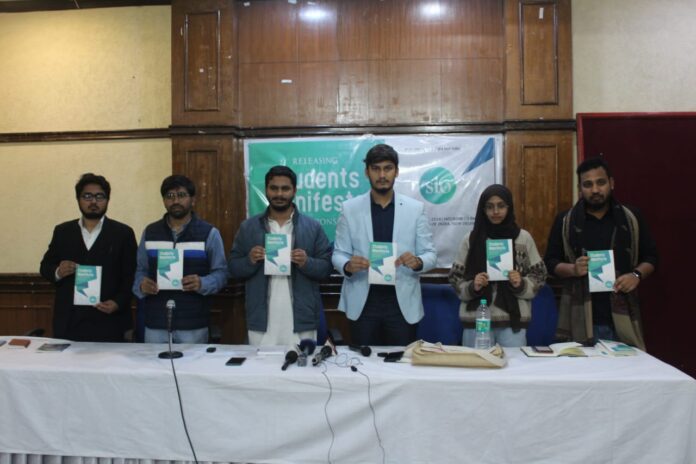
India Tomorrow
NEW DELHI—Expressing serious concern over inadequate budgetary allocation for education and withdrawal of scholarship schemes for students from the religious minorities, Students’ Islamic Organisation of India (SIO) has made several demands like a fair and just reservation system to ensure opportunities for all, ensure justice and safety of all students and development of backward regions of the country.
These demands are a part of the “Students’ Manifesto-2024” for the forthcoming Parliamentary elections, that was released at the Press Club of India two days ago.
The student body also demanded enactment of ‘Rohit Vemula Act’ to prevent suicide in campuses by Dalit scholars, reintroduction of Maulana Azad National Fellowship(MANF) scheme for six notified minorities communities – Buddhist, Christian, Jain, Muslim, Parsi and Sikh – by the central government to pursue M.Phil and PhD. MANF was a five-year fellowship for eligible students in the form of financial assistance for doing M.Phil and PhD.
The SIO also demanded allocation of Rs. 1000 crore for environmental initiatives and sustainable practices, setting up of Mental Wellness Centres for youth across India, bringing employment guarantee act to ensure job guarantee to youths, and ensuring free and compulsory education from primary to university level.
The SIO leaders urged the Government of India to increase public healthcare budget of the country. They said India allocated only 2.1 percent of its DGP on public healthcare while countries like Japan, Canada and France allocated almost 10 percent of their GDP.
They expressed concern over reduction in education budget share to 2.9 percent against the target of six percent by the New Education Policy 2020.
They also raised the issue of literacy which is 74.4 percent, far below the world average of 86.3 percent.
Pointing out that there were around 10 lakh vacant posts in different ministries as per information shared by the Prime Minister’s office in March 2023, SIO leaders said that government is not serious about filling vacant positions across universities and ministries.
They said that the dropout rates among Muslim students ass per survey report of the Institute of Objective Studies was 23.1 percent, surpassing the national average of 18.96 percent. The enrolment of Muslim students dropped from 5.5% in 2019-20 to 4.6% in the academic year 2020-21.
They also expressed deep concern over the mental health crisis, citing National Crime Records Bureau data reporting suicide as the leading cause of death among people aged 15 to 30, with an average of 34 students taking their lives every 42 minutes.
They said that students and youth are the biggest constituency of this country and political parties must specially cater to their needs when seeking votes.
Those who addressed the press conference included SIO president Ramees EK, SIO’s national secretaries Abdullah Faiz and Dr. Roshan Mohiddin.




